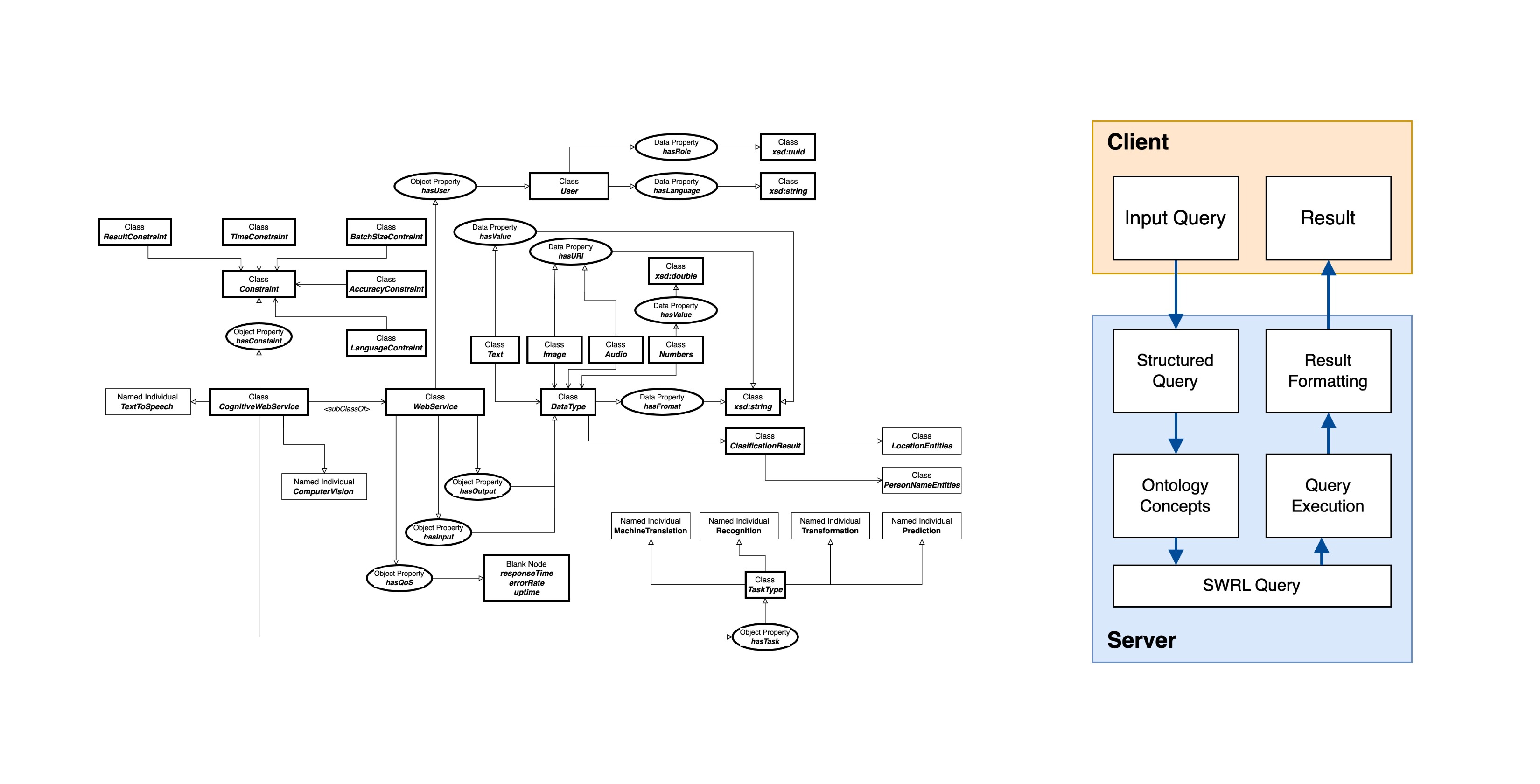Development of a semantic structure for the composition of cognitive web services
DOI:
https://doi.org/10.15587/2706-5448.2025.322370Keywords:
semantic framework, cognitive web services, service composition, ontology-based modeling, service orchestrationAbstract
The object of the research is the semantic structure for the composition of cognitive web services. The framework is designed to model, search, and orchestrate cognitive web services, including functionalities such as text recognition, language translation, and sentiment analysis, within dynamic environments. The problem addressed is the lack of efficient and scalable mechanisms for the automated discovery and composition of cognitive web services that can adapt to changing requirements and meet Quality of Service (QoS) constraints. Existing approaches often rely on static rules or keyword-based searches, which fail to provide adequate precision, adaptability, or scalability for complex service ecosystems.
The key result of the study is the development of a semantic framework that integrates ontology-based service modeling with logical inference using SWRL (Semantic Web Rule Language) rules. The framework supports dynamic service composition by leveraging semantic relationships between services, input/output data, and constraints such as execution time and accuracy. The results demonstrate higher semantic precision, better adaptability to changes, and improved QoS compliance compared to existing approaches. This is achieved through the use of a formalized ontology for precise service representation, SWRL rules for automated inference, and dynamic service composition based on semantic relationships, which improves query matching and reduces execution time.
The proposed framework can be practically applied in environments requiring adaptive service orchestration and composition, such as intelligent automation systems, cloud-based service ecosystems, and IoT (Internet of Things) applications. Its effectiveness is especially evident in scenarios involving complex multiservice workflows where traditional approaches are inefficient. The framework's extensibility ensures its applicability across various domains, with minimal customization required to incorporate new services or workflows.
References
- McIlraith, S. A., Son, T. C., Zeng, H. (2001). Semantic Web services. IEEE Intelligent Systems, 16 (2), 46–53. https://doi.org/10.1109/5254.920599
- Martin, D., Burstein, M., McDermott, D., Hobbs, J., Lassila, O., Narayanan, S. et al. (2004). OWL-S: Semantic Markup for Web Services. W3C Member Submission.
- Horrocks, I., Patel-Schneider, P. F., van Harmelen, F. (2003). From SHIQ and RDF to OWL: the making of a Web Ontology Language. Journal of Web Semantics, 1 (1), 7–26. https://doi.org/10.1016/j.websem.2003.07.001
- Sirin, E., Parsia, B., Grau, B. C., Kalyanpur, A., Katz, Y. (2007). Pellet: A practical OWL-DL reasoner. Journal of Web Semantics, 5 (2), 51–53. https://doi.org/10.1016/j.websem.2007.03.004
- Paolucci, M., Kawamura, T., Payne, T. R., Sycara, K. (2002). Semantic Matching of Web Services Capabilities. The Semantic Web – ISWC 2002, 333–347. https://doi.org/10.1007/3-540-48005-6_26
- Azure Cognitive Services: What are they? Available at: https://www.dev4side.com/en/blog/azure-cognitive-services Last accessed: 18.11.2024
- Prud’hommeaux, E., Seaborne, A. (2008). SPARQL Query Language for RDF. W3C Recommendation.
- Brown, T., Mann, B., Ryder, N., Subbiah, M., Kaplan, J., Dhariwal, P. et al. (2020). Language Models are Few-Shot Learners. Advances in Neural Information Processing Systems.
- A Java API for OWL Ontologies. OWL API. Available at: https://owlcs.github.io/owlapi/ Last accessed: 18.11.2024
- Eclipse RDF4J. Scalable RDF for Java. Available at: https://rdf4j.org Last accessed: 18.11.2024
- Klusch, M., Kapahnke, P. (2010). iSeM: Approximated Reasoning for Adaptive Hybrid Selection of Semantic Services. 2010 IEEE Fourth International Conference on Semantic Computing, 184–191. https://doi.org/10.1109/icsc.2010.11
- Luo, G., Tan, W., Fan, J., Zhou, Q. (2011). Optimizing QoS-Aware Semantic Web Service Composition. IEEE International Conference on Web Services (ICWS), 439–446. https://doi.org/10.1007/978-3-642-04930-9_24
- Bhuvaneswari, A., Sumathi, K., Sarveshwaran, V., Sivasangari, A. (2024). Hybrid deep learning and similarity measures for requirements-driven composition of semantic web services. Knowledge and Information Systems, 67 (2), 1627–1649. https://doi.org/10.1007/s10115-024-02244-x

Downloads
Published
How to Cite
Issue
Section
License
Copyright (c) 2025 Ihor Kasianchuk, Anatoliy Petrenko

This work is licensed under a Creative Commons Attribution 4.0 International License.
The consolidation and conditions for the transfer of copyright (identification of authorship) is carried out in the License Agreement. In particular, the authors reserve the right to the authorship of their manuscript and transfer the first publication of this work to the journal under the terms of the Creative Commons CC BY license. At the same time, they have the right to conclude on their own additional agreements concerning the non-exclusive distribution of the work in the form in which it was published by this journal, but provided that the link to the first publication of the article in this journal is preserved.







